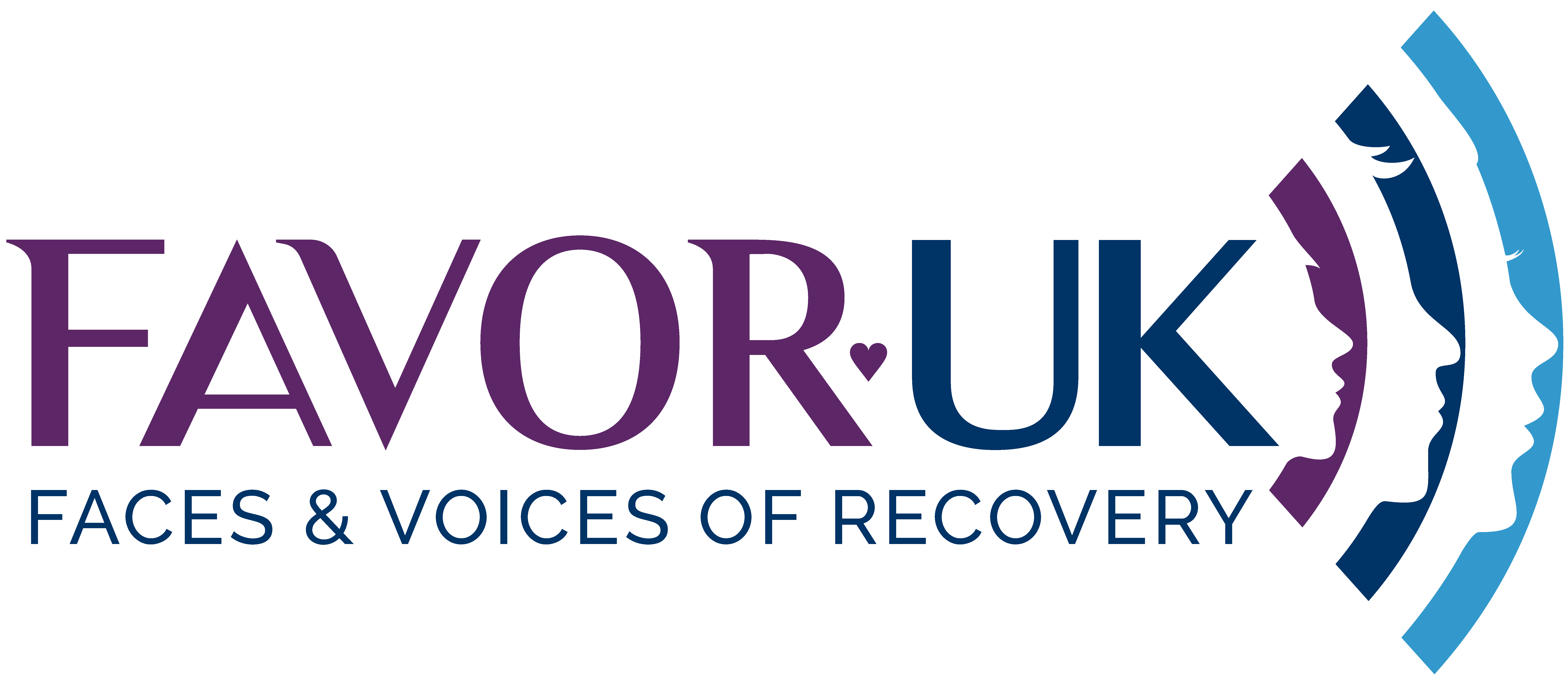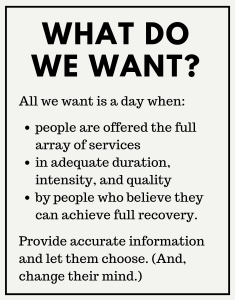- The Bill enshrines in law the right to seek treatment and that treatment to lay out ALL appropriate treatment options that the COUNTRY has at its disposal.
- If that care plan was breached for no apparent reason, without consent, or if a treatment option was refused (with written reasons why) then the person can seek advice to raise a judicial challenge.
- Scottish Government states: “We would argue people already have rights to health care that meets their needs”
- There are no legal obligations beyond the general duties of Secretary of State and the Scottish Ministers outlined in Sections 1 & 1A of the National Health Service (Scotland) Act 1978 and Section 1 of Public Health (Scotland) Act 2008 covering treatment of choice.
- There is not a level playing field across the country in terms of treatment choice.
- The Scottish Government approach elsewhere, such as the UNCRC rights of child bill, is completely different
- The Bill will deliver the highest protection possible for children’s rights across Scotland within the powers of this Parliament and ensure that a rights-respecting approach is at the heart of our recovery from the pandemic.
- In Scotland, child rights are already broad and all-encompassing – yet, new Bills are being brought in, and the same can not be said for the recovery community.
- The Right To Recovery Bill takes existing legislation and pushes it further by making law the right to seek treatment and that treatment to lay out ALL appropriate treatment options that the COUNTRY has at its disposal.
The Right to Recovery Bill enshrines in law the right to seek treatment, and that treatment to lay out ALL appropriate treatment options that the COUNTRY has at its disposal. It would then be down to the person seeking treatment, and their allocated worker to form a care plan. If that care plan was breached for no apparent reason, without consent, or if a treatment option was refused (with written reasons why) then the person can seek advice to raise a judicial challenge – similar to homeless applicants refused homeless accommodation under s29 of the Housing (Scotland) Act – for example.
Recently, the Scottish Government stated: “we would argue people already have rights to health care that meets their needs, and what we need to do is ensure people [have] rights to good health, and support and treatment, that is implemented. It is worth noting that there isn’t any legal obligation beyond the general duties of Secretary of State and the Scottish Ministers outlined in Sections 1 & 1A of the National Health Service (Scotland) Act 1978 and Section 1 of Public Health (Scotland) Act 2008 covering treatment of choice. Nor does this bring equity or a level playing field across the country, so a “postcode lottery” still applies, never mind treatment of choice.
To look into Scot Gov’s approach elsewhere, on UNCRC rights of child bill, John Swinney said: “The Bill will deliver the highest protection possible for children’s rights across Scotland within the powers of this Parliament and ensure that a rights-respecting approach is at the heart of our recovery from the pandemic… But it does not represent the end of the journey in making children’s rights real. It is now incumbent upon us all to ensure the Bill’s ambitions are translated into real-life improvements which transform the lives and life chances of our children and young people.”
As we all know, this is not the same for people with addiction issues and their families. As there are no pieces of legislation that allows it. We keep hearing about Patients Rights Act 2011 as an example. Well section 20 of that Act basically states no one will be held accountable if that Act isn’t applied. So, in summary, the Government’s approach for children: “the highest protection possible” with the “we already have some laws’ ‘ for those seeking treatment is not comparable. We are not saying for a minute we shouldn’t have these for children – of course we should 100%. So we are keen to hear what these “rights” are that already exist, and if an existing “right” can’t be effectively implemented through the legal process, how much of a right is it?
If an existing “right” can’t be effectively implement through the legal process, how much of a right is it?
The right to recovery bill would ensure in law the right to seek treatment and that treatment to lay out ALL appropriate treatments options that the COUNTRY has at its disposal.
We will update further with a mock up of case studies & what would
happen if the law was in place to illustrate further ASAP.
Youc an read more about the bill & contact your MSP to support i there
1. The general principles of the Bill are:
a) Any individual seeking addiction and/or substance misuse treatment is able to quickly access their
preferred treatment option, unless a medical professional deems it would be harmful to the
individual.
b) No individual shall be denied access to their preferred addiction and/or substance misuse
treatment option, unless a medical professional deems it would be harmful to the individual.
c) Should an individual request an addiction and/or substance misuse treatment option and be
refused immediate access to that treatment, a medical professional will be required to provide a
written explanation detailing the grounds of refusal within 24 hours.
2. The Bill would seek to provide a statutory right to addiction and
recovery treatment services including, but not limited to, the following:
a) Short-term residential rehabilitation.
b) Long-term residential rehabilitation.
c) Community-based rehabilitation.
d) Residential detoxification.
e) Community-based detoxification.
f) Stabilisation services.
g) Substitute prescribing services.
h) Any other forms of treatment as a health professional may deem appropriate, in line with
guidance from the Scottish Ministers.
3. The Bill would seek to prevent individuals seeking drug and alcohol treatment services from being refused access for reasons including, but not limited to, the following:
a) A medical history of substance misuse.
b) A criminal history involving substance misuse.
c) The outcome of a mental health assessment.
d) The individual currently being in receipt of substitute prescribing services, regardless of the
volume of prescription.
e) The individual currently still undertaking alcohol and/or drug misuse.
Implementation
4. Section 1 of The National Health Service (Scotland) Act 1978 places a general duty on the Scottish
Ministers to continue to promote a free, comprehensive and integrated health service to secure:
a) improvement in the physical and mental health of the people of Scotland and
b) the prevention, diagnosis and treatment of illness.
Section 1A(1) of the Act permits the Scottish Ministers to do anything they consider is likely to
assist in the duty to promote the improvement of the physical and mental health of the people
of Scotland. 1A(2) permits Scottish Ministers to do anything which they consider is likely to assist in
discharging that duty including, in particular:
a) giving financial assistance to any person,
b) entering into arrangements or agreements with any person,
c) co-operating with, or facilitating or co-ordinating the activities of, any person.
These provisions contain what are called “target duties”. These duties are expressed at a high
level of generality, with an aim only to secure the provision of public services.
We propose an insert of a new section to the 1978 Act to require the Scottish Ministers to
enshrine the rights of people with substance misuse issues and to transfer these rights from a
general duty to a statutory duty.
Right to Recovery (Scotland) Bill Proposal | June 2021 | 3
5. In performing the duty under the new section, the Scottish Ministers will be required to introduce
a scheme to enable a person access to an individual holistic ‘care plan’ in line with the “Orange
Book – Drug misuse and Dependence: UK guidelines on clinical management”. This will be a ‘plan
agreed with, and offered to, an individual to treat that person’s addiction issues.
This should include the options of residential or community-based detoxification, stabilisation
services, residential and community-based rehabilitation, substitute prescribing (of choice) and such other forms of treatment as the Scottish Ministers may deem appropriate.
A plan may also include support, aftercare or throughcare measures including
housing/accommodation, employability support, training, community-based support, voluntary work experience and any other psychosocial support to enable someone to fulfil the desired out come discussed in their plan.
6. This plan should also include services for the children and families of the person. This should
ensure that parental rights are protected when someone seeks treatment and ensure that the
family remain as a unit and that at no time should a person fear losing their family at a time of need.#
7. That the Scottish Ministers make regulations to provide a person with a right to be assessed for a
care plan within a reasonable period of approaching the relevant services and asking for
assistance. The person will only have services offered and provided under a care plan if they choose this and are eligible for that treatment. Scottish Ministers must make provision for the timeframe under which particular care plans must be implemented. This should also require the Scottish Ministers to set out which professionals can carry out a care plan assessment and what
their role will be during that process.
8. Additional to the changes in legislation it should be required that the Scottish Ministers must
provide a Code of Guidance of Drug Treatment in Scotland, following the guidance and
recommendations in the UK guidelines on clinical management, giving guidance to any person
doing a care plan. Anyone carrying out these plans and assessments must adhere to the
Code and in terms of the law would be expected to follow the guidance unless there is a reason
not to (residential rehabilitation waiting times or other practical reasons for example). The Code
should be available to be reviewed and amended when the occasions is required.
9. That the Scottish Ministers commission an independent regulatory body to monitor the
performance of the duties and guidance, to ensure that all partners, statutory and third sector are
held equally accountable.

